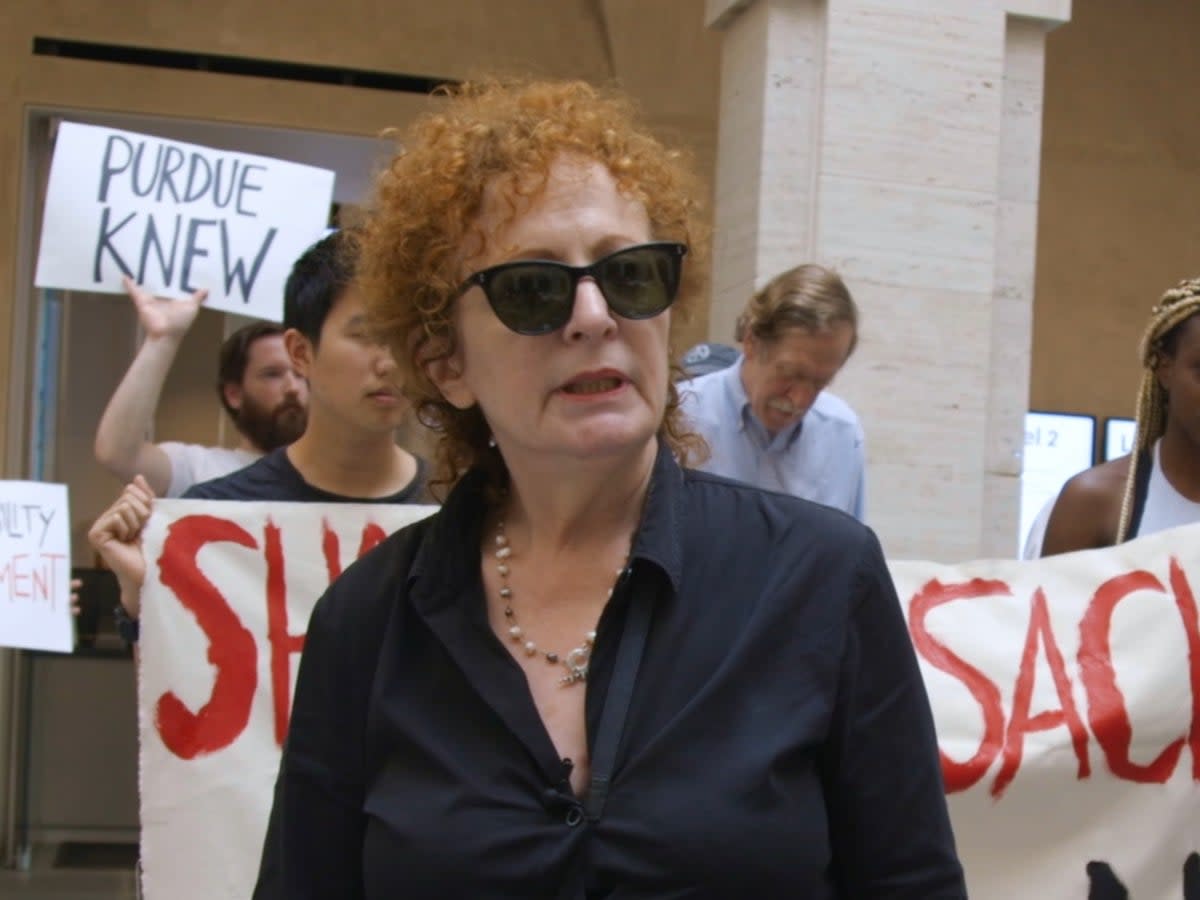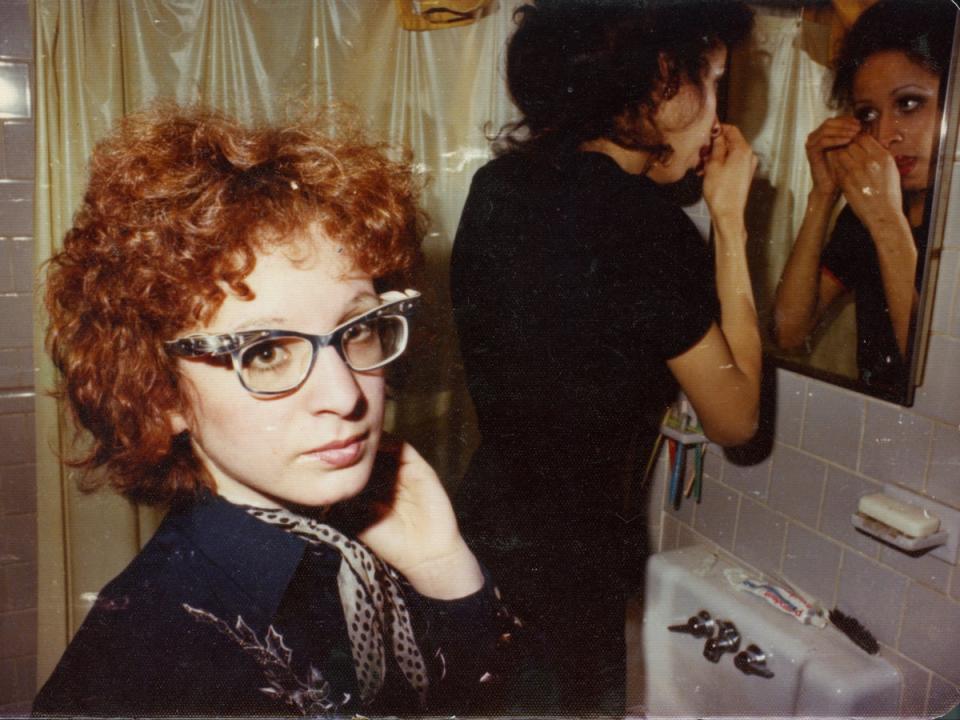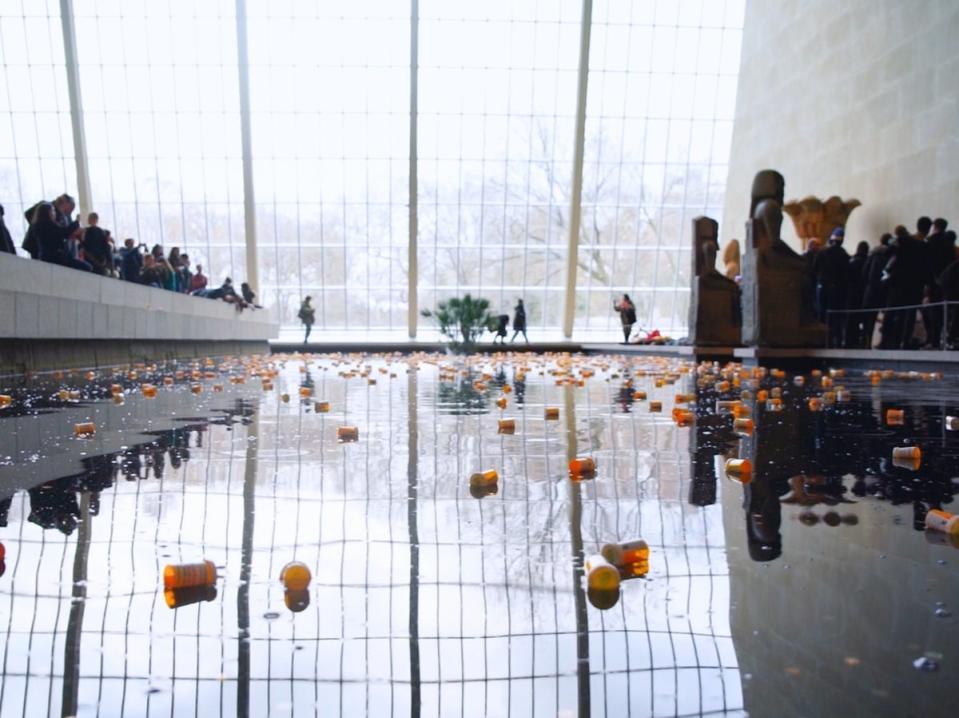All the Beauty and the Bloodshed: How photographer Nan Goldin took on the Sackler family – and won

It’s hard to quite comprehend the scale of the North American opioid crisis. The rise of the hyper-addictive prescription painkiller OxyContin – a “blockbuster drug”, in putrid Big Pharma parlance – has led to more than 600,000 deaths in the US and Canada since 1999. Experts have predicted that as many as 1.2 million more people may die from opioid overdoses by the end of the decade. Sometimes, the drug itself proves fatal; often, it leads directly to the use of other potentially deadly drugs, such as heroin or fentanyl. (Around 80 per cent of heroin addicts now begin on prescription opioids.) The tendrils of the opioid epidemic touch more or less every person in the US in one way or another. And at the head of it all, there is the Sackler family.
Beginning in 1995, through their pharmaceutical company Purdue Pharma, members of the Sackler family oversaw an unprecedented push to drive up prescriptions of opioids nationwide. Doctors were given financial incentives to overprescribe OxyContin to patients; the FDA [Food and Drug Administration] was pressured to minimise the drug’s addictiveness on its label. The Sacklers’ ugly role in the opioid crisis was dramatised in the masterful 2021 Hulu miniseries Dopesick, starring an Emmy-winning Michael Keaton. Now it’s being addressed in the new documentary All the Beauty and the Bloodshed, which was nominated for an Oscar earlier this week. But the Sacklers aren’t the main focus of the story here. Rather, All the Beauty follows Nan Goldin, the woman who began fighting them – not for the impossible dream of justice, but for some semblance of accountability. Remarkably, she won.
“I had been following what Nan was doing in the news,” says Laura Poitras, All the Beauty’s director, who previously won an Oscar for her 2014 Edward Snowden doc Citizenfour. “I was really excited about it.” Goldin was already a giant of the art world: a seminal photographer whose profoundly personal work The Ballad of Sexual Dependency expanded the parameters of the very medium itself. In 2017, Goldin formed PAIN (Prescription Addiction Intervention Now), a group of “artists, activists and addicts that believe in direct action”, in an effort to hold the Sacklers to account. Goldin had first-hand experience of OxyContin’s potential for abuse, having got hooked (and then clean) after being prescribed the medication for an injury. Using tactics inspired by the 1980s protest group ACT UP, which fought for positive political change during the Aids epidemic, PAIN targeted the Sacklers’ most benevolent face: the many illustrious arts galleries and institutions through which they had laundered their reputation.
PAIN’s initial aims were simple: to convince museums to stop accepting donations from the Sackler family, and to remove the Sackler name from their buildings. To achieve this, they staged a succession of headline-grabbing stunts – “die-ins”; rallies; elaborate acts of protest art involving blood-soaked “money” or piles of phoney pill-bottles.
Goldin and other members of PAIN had already been filming behind the scenes of their endeavours for some time when Poitras started documenting them. “I was really excited that Nan was leveraging her power in the art world to call for accountability,” she tells me. “That doesn’t happen every day, right?”
At one point, after the protests were under way, Goldin and other members of PAIN came to the chilling realisation that they were being followed by men in vans – private investigators, it is speculated, hired by Purdue. “This was important to include in [All the Beauty and the Bloodshed] because surveillance is used as a tactic of power all the time,” says Poitras, whose previous documentaries have often explored surveillance and government intimidation (and who has herself been the target of extensive government surveillance). “If it’s the US government, or if it’s powerful billionaire families targeting activists, there are certain playbooks and surveillance is one of them.”
Footage shown in the film, captured by PAIN activists, shows vans lurking outside their properties. Men sit in the vehicles, unfazed that they are being filmed. It’s clearly a rattling experience. “There’s surveillance where you want to get information, and then there’s surveillance where you want to intimidate,” explains Poitras. “This was clearly in the intimidation category.”

All the Beauty intersperses footage of Goldin’s work with PAIN with a deep dive into the artist’s backstory. We learn about Goldin’s sister, Barbara, who rebelled against oppressive social norms and died by suicide after being repeatedly institutionalised. About Goldin’s young adulthood, spent in the vibrant, druggy vortex of New York’s queer underground scene. About her struggles with addiction. Her unhappy time as a sex worker. Her abusive partner, who once beat her around the eyes so badly that it’s suggested he was trying to blind her. Goldin collaborated on the film, and had a particularly close involvement in the film’s handling of her late sister, and her assault.
The Goldin we meet in the present is a calmer, more grounded person than the radical artist we piece together through reminiscences and old photographs. But she is still the same fighter. “I wouldn’t use the word ‘subversiveness’ to describe what compels Nan to make art or to engage in activism,” says Poitras. “I feel like it’s responding to the world that she’s living in.” In 2019, PAIN’s work began to bear fruit; museums such as the Metropolitan Museum of Art, the Guggenheim Museum and the Louvre began cutting ties with the Sacklers. Over the next few years, they would fall like dominoes.
It is by no means an exclusively US-based effort: the Sacklers have pumped money into many of the world’s most prestigious establishments, including plenty in the UK. In September last year, London’s Victoria and Albert Museum became the last of the country’s major arts institutions to remove the Sackler name from its building. Grasping the devastating extent of the opioid crisis can nonetheless be harder for people in the UK. Here, opioid use has climbed sharply over the past decade, particularly in the North East, with deaths having risen to around 2,000 per year. But, as noted by the Priory Group, the US’s opioid epidemic is “not remotely comparable with the situation” over here. In the UK, pharmaceutical companies are not able to market drugs directly to patients, or to provide doctors with lucrative financial incentives to prescribe certain drugs.
Unfortunately, the film is as much about impunity as it is about any kind of a victory
Laura Poitras
“It’s a really dark indictment of the United States,” Poitras says. “You know that the Sacklers lobby the FDA [Food and Drug Administration] to downplay the addictive properties of this drug on the label. And then you have the family directly marketing it to doctors, taking doctors on vacations, finding out who was overprescribing and then really pushing the drug on them.”
Of course, these actions were all technically illegal from the get-go. By law, Purdue should have been stopped two decades ago, when it first began its efforts to peddle OxyContin to the masses. “And yet we’ve continued to allow it to happen,” Poitras adds. “I think it’s part of the failure of American capitalism: the profits of this corporation seem to matter more than people’s lives.”

Though All the Beauty and the Bloodshed ends on a note of catharsis, the victory is a qualified one. Tearing down the Sacklers’ philanthropic reputation in the art world does not equate to real justice. Yet it is, more than anything, symbolic. “Nan would be the first to say that,” admits Poitras. “Unfortunately, the film is as much about impunity as it is about any kind of a victory. But I do want to celebrate that PAIN achieved something meaningful, by taking the name down and shaming them.
“But truly, Richard Sackler should be indicted by the justice department,” she adds. “There should be criminal charges filed. That’s what should happen in a functioning society.” Purdue has pleaded guilty on two occasions to criminal charges, but no member of the Sackler family has ever been charged with a crime. In 2020, Purdue, which filed for bankruptcy in 2019, settled a lawsuit with a payout worth around $8bn (£6.45bn).
All the Beauty and the Bloodshed is a complicated, deeply moving testament to Goldin, both as an artist and as a person. As Poitras says, her importance as a photographer and as an artistic humanist has long been beyond question. “But the fact that she also took down a billionaire family – now she’ll be remembered for that, too.”
‘All the Beauty and the Bloodshed’ is out in cinemas now